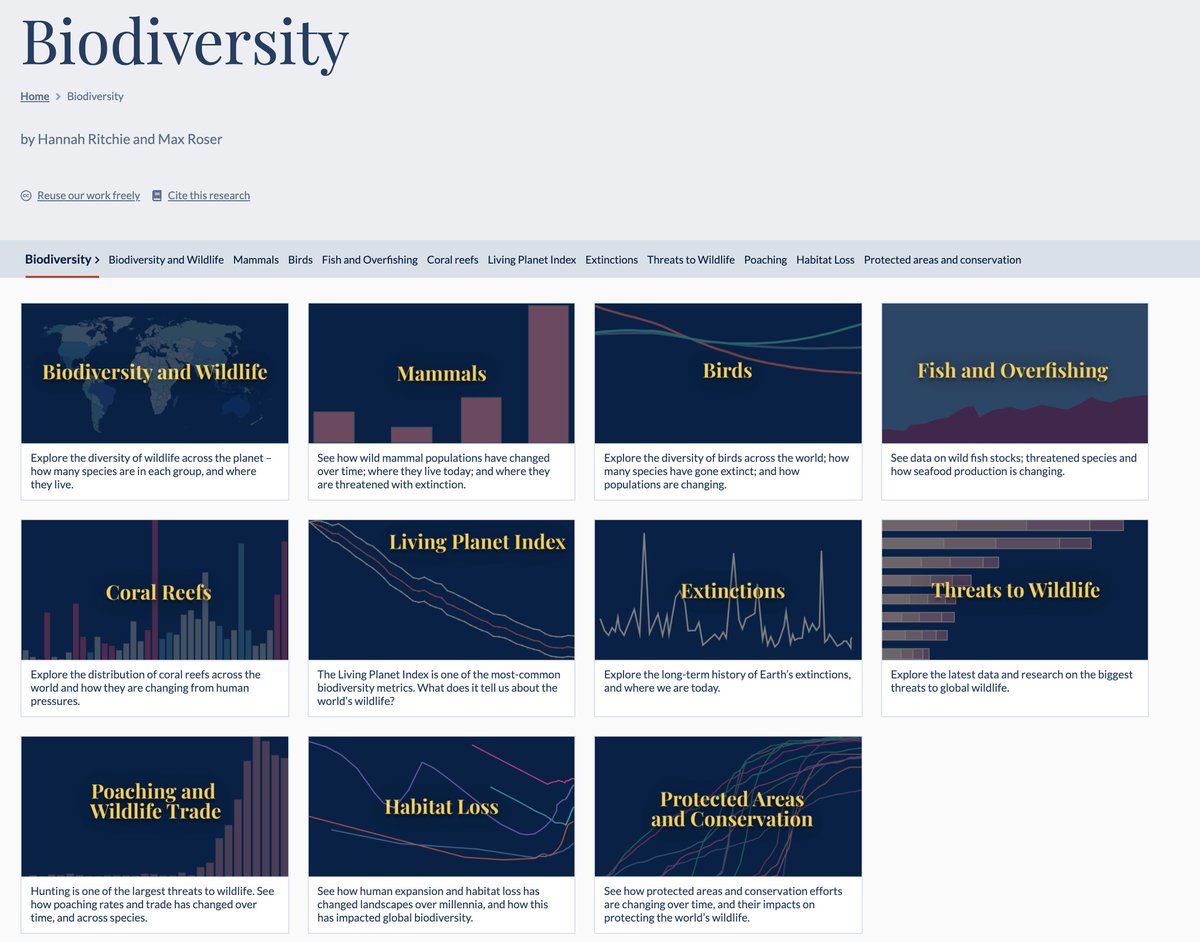It's Nature Day at #COP26
There are many win-win solutions for climate, land use and biodiversity.
Most relate to food: what we choose to eat and how we produce it.
Here's some of our work from @OurWorldInData on these topics 🧵👇
There are many win-win solutions for climate, land use and biodiversity.
Most relate to food: what we choose to eat and how we produce it.
Here's some of our work from @OurWorldInData on these topics 🧵👇
If we want to stop climate change we must transition away from fossil fuels. There's no way around that.
But we also can't solve it without addressing food.
Emissions from food alone could take us past our carbon targets
ourworldindata.org/food-emissions…
But we also can't solve it without addressing food.
Emissions from food alone could take us past our carbon targets
ourworldindata.org/food-emissions…

One-quarter to one-third of global greenhouse gas emissions come from the food system.
ourworldindata.org/greenhouse-gas…
ourworldindata.org/greenhouse-gas…

When we want to reduce the impact of food we often focus on aspects like packaging, or transport.
But these make up just 5-6% of emissions from food each.
Most emissions come from the farm or land use changes.
ourworldindata.org/food-ghg-emiss…
But these make up just 5-6% of emissions from food each.
Most emissions come from the farm or land use changes.
ourworldindata.org/food-ghg-emiss…

Since the role of transport is so small for most products, this means:
*What* you eat has a much larger impact on the footprint of your diet than where it comes from.
The "eat local" message (for climate reasons) is often overhyped.
ourworldindata.org/food-choice-vs…
*What* you eat has a much larger impact on the footprint of your diet than where it comes from.
The "eat local" message (for climate reasons) is often overhyped.
ourworldindata.org/food-choice-vs…

A big criticism of standard comparisons of the emissions of different food products is that they're based on global averages (that is fair).
In this article I look at the full distribution of footprints:
ourworldindata.org/less-meat-or-s…
In this article I look at the full distribution of footprints:
ourworldindata.org/less-meat-or-s…

Another reasonable criticism of comparisons of beef/lamb to other foods is that they're dominated by methane – a powerful but short-lived GHG.
Here I show methane accounts for a large chunk of difference, but the story is similar even when we exclude it
ourworldindata.org/carbon-footpri…
Here I show methane accounts for a large chunk of difference, but the story is similar even when we exclude it
ourworldindata.org/carbon-footpri…
For biodiversity & climate we need to reduce amount of land we use for agriculture
One way to do that is to adopt a more plant-based diet. Doesn't need to be vegan, but reducing helps a lot
Switching from beef --> chicken or fish also helps a lot
ourworldindata.org/land-use-diets
One way to do that is to adopt a more plant-based diet. Doesn't need to be vegan, but reducing helps a lot
Switching from beef --> chicken or fish also helps a lot
ourworldindata.org/land-use-diets

Another massive win for climate and biodiversity is to increase crop yields.
This is going to be particularly important across Sub-Saharan Africa where expanding cropland threatens a lot of forests and natural habitat.
ourworldindata.org/yields-habitat…
This is going to be particularly important across Sub-Saharan Africa where expanding cropland threatens a lot of forests and natural habitat.
ourworldindata.org/yields-habitat…

We have a data explorer where you can explore data on crop yields & yield gaps across the world:
ourworldindata.org/crop-yields
ourworldindata.org/crop-yields

We also have a data explorer where you can explore the environmental impacts of different foods.
Change between metrics (emissions, land use, water use) and units of measurement (per kg, kilocalorie, protein).
ourworldindata.org/explorers/food…
Change between metrics (emissions, land use, water use) and units of measurement (per kg, kilocalorie, protein).
ourworldindata.org/explorers/food…

In our work on Biodiversity we look at what's happening to nature and wildlife across the world.
ourworldindata.org/biodiversity
ourworldindata.org/biodiversity

In our work on deforestation we cover the long historical trends in global deforestation, as well as what's driving it today.
ourworldindata.org/forests-and-de…

ourworldindata.org/forests-and-de…


As with all of our work at @OurWorldInData, we make it free and provide it as a public good.
If the data or a chart is useful and you want to use it, please do.
If the data or a chart is useful and you want to use it, please do.
• • •
Missing some Tweet in this thread? You can try to
force a refresh


















